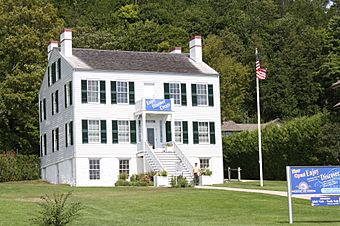Richard and Jane Manoogian Mackinac Art Museum facts for kids
|
Richard and Jane Manoogian Mackinac Art Museum
(listed as Indian Dormitory) |
|
|
U.S. National Historic Landmark District
Contributing Property |
|

Indian Dormitory in 2011
|
|
| Location | Huron St., Mackinac Island, Michigan |
|---|---|
| Built | 1837 |
| Architect | Oliver Newberry |
| Part of | Mackinac Island (ID66000397) |
| NRHP reference No. | 71000408 |
Quick facts for kids Significant dates |
|
| Added to NRHP | November 5, 1971 |
The Richard and Jane Manoogian Mackinac Art Museum is an art museum on Mackinac Island, Michigan. It is inside a historic building called the Indian Dormitory. The museum shows art inspired by Mackinac Island. This includes old paintings, maps, and photos from the 1800s and 1900s. You can also see Native American art and beaded clothes. Plus, there's modern art and photos from artists in the area.
This museum is one of many cool places to visit in Mackinac Island State Park.
Contents
Exploring the Museum's History
The Indian Dormitory is a building from 1838. It was built by the U.S. government on Mackinac Island. This building was a new idea to house Native Americans visiting the island's Indian agency. From 1867 to 1960, it was used as a public school. Then, from 1966 to 2003, it became a museum about Native American culture. On July 2, 2010, it opened as the Richard and Jane Manoogian Mackinac Art Museum. This museum is run by Mackinac State Historic Parks. The building is listed on the National Register of Historic Places.
The Vision of Henry Schoolcraft
The Indian Dormitory is a piece of history connected to Henry Schoolcraft. He was a U.S. government official in charge of Native American affairs. Schoolcraft worked on Mackinac Island. He noticed that many Native American cultures focused on hunting and gathering food. He thought farming could produce more food.
Schoolcraft believed Native Americans could sell some of their hunting lands to the U.S. government. Then, the government could use that money to teach them farming. This money would also help Native American families during this change. Schoolcraft saw that Native Americans visiting his agency often used temporary shelters. He thought a permanent building would be better.
The 1836 Treaty of Washington
As the Indian Agent, Schoolcraft convinced many Native Americans in Michigan Territory to sell their land. These included members of the Ojibwa and Ottawa tribes. They sold most of northern Lower Peninsula and eastern Upper Peninsula of Michigan. This agreement was made in the 1836 Treaty of Washington.
In return for the land, the government promised to pay money to the Native Americans. They also promised to teach them farming and other skills like blacksmithing. A dormitory was to be built on Mackinac Island. This building would give shelter to Native Americans who came to do business with the Indian Agency. The Indian Dormitory was built in 1838 to keep this promise.
From Dormitory to Schoolhouse
After the treaty payments ended, fewer Native Americans came to Mackinac Island. So, the Indian Dormitory was no longer needed for its first purpose.
In 1867, the building became a public school. It served all children on Mackinac Island. The Thomas W. Ferry School was a schoolhouse from 1867 to 1960. It taught children from many different backgrounds.
By 1960, the old wooden building did not meet modern safety rules for schools. The school building was already surrounded by Mackinac Island State Park land. In 1963, the Park Commission bought the building.
Restoring a Historic Building
In 1964-1965, the Mackinac Island State Park fixed up the Indian Dormitory. They made the inside a museum about Native American culture. The outside was made to look like it did in 1838. The building opened to the public in 1966.
The Mackinac Island Art Museum Today
From 1966 to 2003, the Indian Dormitory was a museum. The lower floors showed how it looked as the Indian Dormitory (1838–1846). The top floor had exhibits about Great Lakes Native American culture. Over time, the way the museum showed Native American culture changed. In 2000, the second floor closed. By 2003, the first floor and basement also closed.
After closing, the State Park studied what to do with the building next. In late 2008, Mackinac State Historic Parks announced plans to reopen it. It would become a museum showing art and culture from the Straits of Mackinac area. The inside was rebuilt from 2008-2010. New systems were added to control the temperature and humidity. This helps protect the art on display. The outside was made to look like it did in 1838. The building reopened on July 2, 2010, as the Richard and Jane Manoogian Mackinac Art Museum.
The Indian Dormitory is now part of the National Register of Historic Places. It also helps Mackinac Island be recognized as a National Historic Landmark.
Images for kids
 | Aurelia Browder |
 | Nannie Helen Burroughs |
 | Michelle Alexander |




